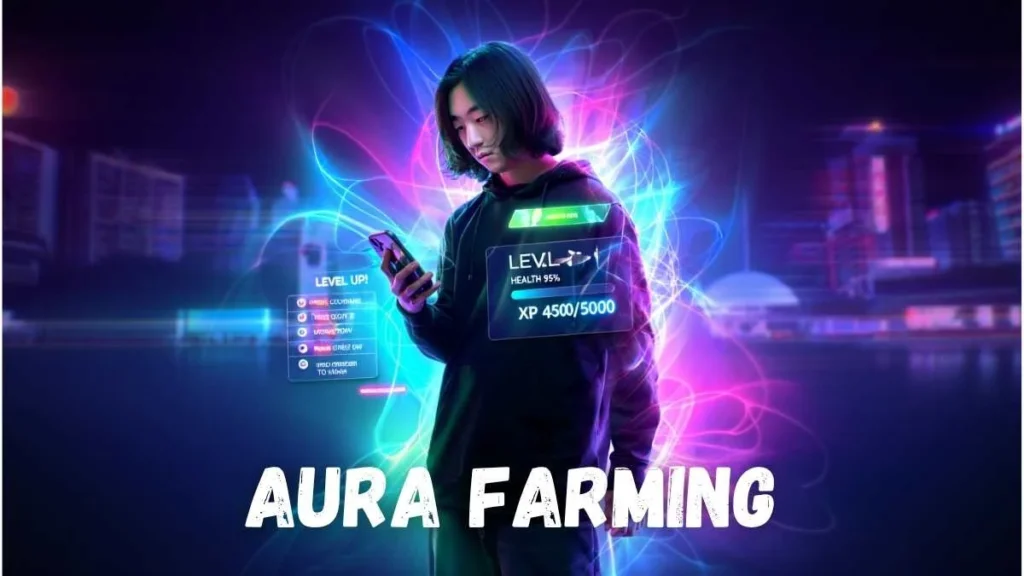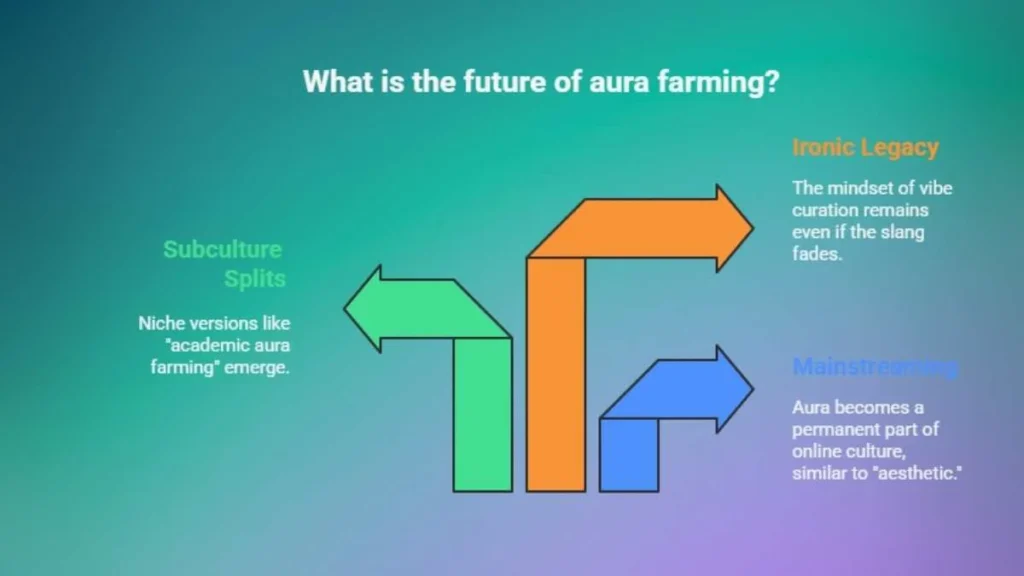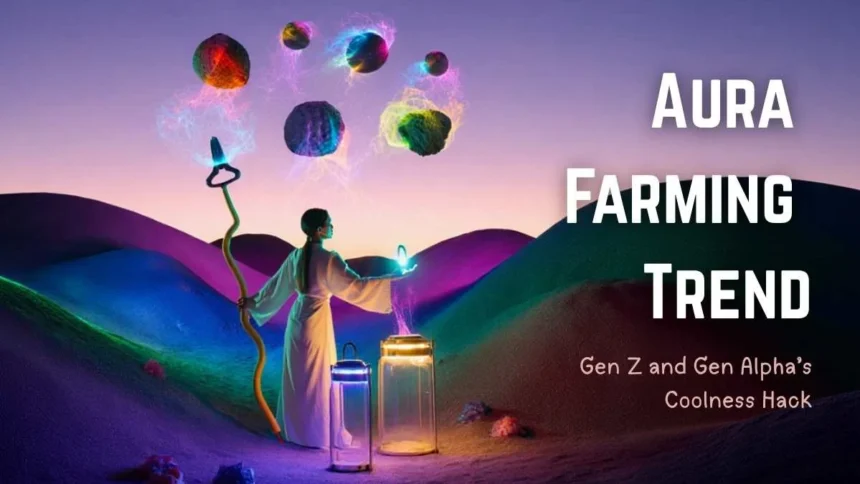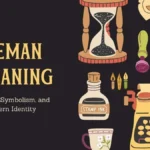Aura farming is a viral internet slang term, popularized by Gen Z and Gen Alpha, describing the act of deliberately curating one’s personality and appearance to project an “effortlessly cool” and confident vibe. The phrase combines aura, a person’s unique vibe or charismatic presence, with farming, a gaming term for repetitive actions to build skills or gain rewards.
In simple words, aura farming is about cultivating self-image and vibe curation in a way that feels natural but is often the result of consistent effort. It blends humor, social media culture, and the psychology of impression management, making it one of the most fascinating trends shaping youth identity today.
Breaking Down the Concept
At its core, aura farming is about crafting an image of effortless charm. Unlike traditional self-improvement practices such as grooming, style refinement, or confidence-building, aura farming emphasizes the illusion of effortlessness. The paradox lies in the “farming” aspect: while it suggests repeated, calculated work behind the scenes, the final presentation is designed to look natural and authentic.

This aligns with the broader internet-native trend of performing identity: how you appear often matters as much as who you are. Aura farming, then, becomes the modern language for mastering the art of being perceived.
Why Gen Z and Gen Alpha Made It Viral
Several cultural shifts explain the rise of this trend:
- Attention Economy: Social platforms reward aesthetics and vibes.
- Identity Quest: Young people want individuality while still fitting in.
- Irony and Humor: Framing identity-building as “farming” makes it fun.
- Influencer Impact: Celebrities model the exact aura that fans imitate.
Popular Strategies of Aura Farming
Not everyone farms their aura the same way. Some focus on fashion, others on digital branding, and many on personality tweaks. The most common approaches include:
Lifestyle and Fashion Choices
- Minimalist or coordinated outfits.
- Skincare and wellness routines are presented casually.
- Daily habits framed as effortless rituals.
Personality Tweaks
- Calm body language and composed posture.
- Strategic silence, speaking less but with impact.
- Witty, understated humor.
Digital Presence
- Curated Instagram feeds with soft tones.
- Consistent username aesthetics.
- Posting patterns that seem casual yet calculated.
Aura Farming and Traditional Self-Branding
| Aspect | Aura Farming | Traditional Branding |
| Goal | Project effortless coolness | Build authority/credibility |
| Effort Style | Repetitive, subtle adjustments | Planned, structured campaigns |
| Platforms | TikTok, Instagram, Snapchat | LinkedIn, portfolios, resumes |
| Tone | Ironic, playful, mysterious | Formal, professional, intentional |
| Audience | Peers, online communities, followers | Employers, clients, wider networks |
The Psychology Behind It
Aura farming taps into deep psychological needs, combining elements of impression management from sociology, where individuals shape how they are perceived, and the rise of parasocial relationships, in which curated personas influence how strangers connect online. For many young people, aura farming provides a sense of self-validation, giving them control over identity in uncertain social environments. At the same time, it establishes hierarchies of social status, where those with the most polished auras gain greater influence and attention. However, it also highlights the authenticity paradox: while farming is deliberate and calculated, it must appear effortless, reflecting how authenticity itself has become performative in the digital age.
Challenges and Criticism
Aura farming isn’t universally positive. Some concerns include:
- It may encourage inauthenticity over genuine connection.
- Farming a vibe daily can increase social anxiety and pressure.
- Often tied to exclusive beauty standards that not everyone fits.
- Like other slang, it may fade quickly, leaving traces only in meme culture.
Beyond Slang: Real-World Relevance
Aura farming is more than just a playful internet term; it reflects how self-presentation works in the digital era. In business, it closely mirrors the principles of personal branding, where individuals shape professional identities to attract opportunities. From a psychological lens, it parallels identity performance, showing how people manage impressions to fit into different social contexts. Even in marketing, brands adopt similar strategies by cultivating a distinct “aura” around products to resonate with audiences. In this way, aura farming serves not only as social play but also as a revealing window into the broader dynamics of modern identity politics.
Future of Aura Farming
What lies ahead for this trend? Likely scenarios include:
- Mainstreaming: “Aura” could join “aesthetic” as a permanent word in online culture.
- Subculture Splits: Niche versions like “academic aura farming” may appear.
- Ironic Legacy: Even if slang fades, the mindset of vibe curation will remain.

FAQs
Q1: Is aura farming limited to social media only?
No, it extends offline too, from fashion choices to body language.
Q2: Can aura farming improve real confidence?
Yes, repeated small practices often build actual self-assurance over time.
Q3: Is aura farming the same as faking a personality?
Not exactly, it’s about amplifying traits you already have, not inventing fake ones.
Conclusion
Aura farming reflects how identity in the digital age is less about authenticity and more about the perception of authenticity. It’s a witty, ironic yet meaningful way for Gen Z and Gen Alpha to frame the everyday grind of looking cool without appearing to try.
Whether celebrated as creative self-expression or critiqued for promoting façades, aura farming captures the reality of a world where vibes are currency, and social presence is carefully farmed, one action at a time.






